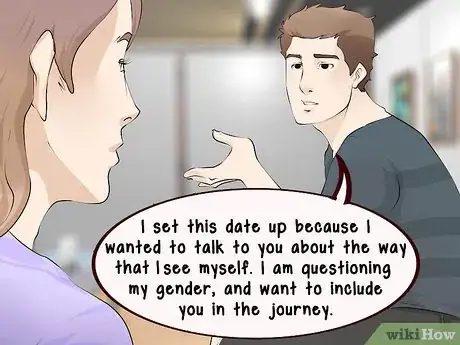This article was co-authored by Lauren Urban, LCSW. Lauren Urban is a licensed psychotherapist in Brooklyn, New York, with over 13 years of therapy experience working with children, families, couples, and individuals. She received her Masters in Social Work from Hunter College in 2006, and specializes in working with the LGBTQIA community and with clients in recovery or considering recovery for drug and alcohol use.
There are 7 references cited in this article, which can be found at the bottom of the page.
This article has been viewed 35,376 times.
Telling your partner that you are questioning your gender identity can be daunting. Share the truth with your partner anyway. Suppressing your true feelings is bad for your health, and can lead to depression or anxiety. It can also damage your relationship with your partner and yourself in the long term.
Steps
Communicating Effectively with Your Partner
-
1Decide what you need to tell your partner about your identity. This topic will likely be confusing for both you and your partner. You should know ahead of time what you want to share with your partner. If you are nervous that you will forget or get off topic, write down the things you want to talk to your partner about.
- Just telling your partner “I’m questioning my gender,” is a good start, but it leaves a lot of unanswered questions. It can help to tell your partner something more explicit like “I feel like I was born the incorrect gender. I am uncomfortable living my life as the gender I was assigned at birth, and I am questioning whether I want to continue living as that gender.”
-
2Be honest and direct. Be clear with your partner about how questioning your gender affects how you view the relationship. If you are interested in continuing the relationship, make sure your partner knows that. If a new gender identity means you plan to leave the relationship, be sure to tell your partner that. If you are not sure what you want, then tell your partner that. Avoiding the truth, or outright lying to your partner, will make your partner uneasy. This can make it harder for them to trust you, especially in a time that can be confusing for them.[1]
- Being honest also allows you to share yourself with your partner and live your life in a genuine way.
- Reassure your partner by saying things like “I know this is confusing to you, but it makes me more comfortable. I still love you and want to be with you, and this change can be positive. For example, I feel more in tune to myself and to you.”
Advertisement -
3Gather as much information as possible to discuss with your partner. Many people know little about the life of a transgender person. You will need to help your partner understand. Tell them stories, collect scientific research articles, and carefully explain your situation.[2]
- Many people may not even understand what gender dysphoria is. This is a good place to start explaining things to your partner from a scientific and medical perspective.
- For example, you might say something like “I know that it is hard to understand, but some people are born this way. I haven’t ‘decided’ to feel this way, it is just part of me.”
- Make sure to give your partner materials that they can read over in their spare time. It is likely that they will not retain a lot of the information you give them, so allowing them to read through it in their own time will be helpful for them.
-
4Explain your needs. With not understanding your situation comes not understanding your needs. Even the most sympathetic of partners may have a hard time knowing what they can do to support you during this time. Be clear and honest about the ways that your partner can be there for you.[3]
- For example, you may need to talk to your partner about your gender daily. On the contrary, you may feel most comfortable if your partner doesn’t bring it up. Say something to your partner like “You can come to me if we need to talk about it, but otherwise, I would prefer not to dwell on the subject every day.”
- Be sure to ask about their needs as well. Try saying something like, “How can I help you process this?”
Initiating the Conversation
-
1Choose a calm and relaxing time to talk. The big news that you are questioning your gender should not be dropped on your partner lightly. Plan a date to go out to the park, take a weekend trip, or do something that you and your partner enjoy. Make sure that you and your partner are both as relaxed as you can be.[4]
- Your partner may have a harder time processing any big news after a long stressful day.
-
2Find a private place to talk. The two of you will have a lot to discuss. Rather than bringing this up at a restaurant, talk over dinner at home. You could also plan a getaway and have a fresh change of scenery for your conversation. Make sure the place you choose is calm and private so that you will not be interrupted.[5]
- If you are afraid that your partner will react violently, you should not disclose this in private. In fact, leaving the relationship altogether might be a good idea. If your partner has negative opinions of transgender people, this might be a warning sign.
- A good option for facilitating a conversation between you and your partner is to meet with a mental health professional, such as a therapist. Try saying something like, "I've started talking to someone about things going on in my life and I'd like you to join me for a session."
-
3Practice the conversation. This will help you be more comfortable with what you want to say. If it helps, you can practice in front of a mirror. If you know where you will be having the conversation, you can go practice there so that you are more comfortable at the time of the conversation.
-
4Tell your partner that you are questioning your gender. Once you make a date and pick nice private place to talk, you can start the conversation. Be clear and direct with your partner. Explain how you feel, and when you are finished, allow them to respond.[6]
- For example, you can just say “I set this date up because I wanted to talk to you about the way that see myself. I am questioning my gender, and want to include you in the journey.”
- Keep in mind that this will likely be very emotional for you. If you start to cry, don’t try to hold it in or feel ashamed. Just take a few deep breaths and take a moment to compose yourself before continuing.
Meeting Emotional Needs
-
1Be prepared to answer questions. Even though you have probably known for a long time that your current gender feels uncomfortable, your partner is no mind reader. This can come as a big change for your partner and your relationship. Answer any questions that you can and reassure your partner that you are still the same person and feel the same way about them.[7]
- Your partner is likely to ask things like “How long have you felt this way,” or “Why didn’t you tell me before?”
- Your partner may also ask something like “Will you change your mind?”
- Your partner may also start to question the entire history of your relationship and wonder whether any of it was real. Make sure to validate this because it is a normal stage in this process.
-
2Be respectful of your partner’s feelings. How you see yourself and your body is your choice alone. Your relationship, however, is comprised of two people. Your partner has a right to their own feelings the same way that you have a right to yours. Allow your partner to express those feelings and be as respectful as you expect them to be of your feelings.[8]
- This does not mean to tolerate abusive or demeaning behavior. Your partner has a right to feel happy, confused, sad, angry, excited, or any combination of emotions, but they do not have the right to lash out at you.
- For example, it is okay for your partner to say something like “This is really confusing for me, and it makes me uncomfortable.” It isn’t okay for them to say something like “You disgust me! I hate you!”
-
3Allow your partner time to think. You have been thinking about how this news would impact your relationship for some time before you told your partner. Now, they may need a turn to think. Do not rush your partner to respond or force them to talk again before they are ready.[9]
- There is no set amount of time that is right. You and your partner will have to feel out the situation and decide how much time is needed.
- Discuss with your partner your feelings about them talking this over with a close friend or family member, or if you would prefer that they find a counselor to speak with for now.
-
4Find a support system. Having a support system will help you to understand who you are and how you feel. It is important to surround yourself with positive people who will not reject you for questioning your gender. It is also a good idea to consider having contact with support groups or other individuals who have gone through the same experiences you are now living.
-
5Practice self-care. Suppressing your feelings is unhealthy and can manifest in a variety of mental and physical ways from headaches to depression. Take the time to allow yourself to question, decide for yourself who you are, and accept yourself. Keep up with your hygiene, both physical and emotional, by exercising regularly, eating well, and resting.
Expert Q&A
-
QuestionHow can I help my partner with gender dysphoria?
 Lauren Urban, LCSWLauren Urban is a licensed psychotherapist in Brooklyn, New York, with over 13 years of therapy experience working with children, families, couples, and individuals. She received her Masters in Social Work from Hunter College in 2006, and specializes in working with the LGBTQIA community and with clients in recovery or considering recovery for drug and alcohol use.
Lauren Urban, LCSWLauren Urban is a licensed psychotherapist in Brooklyn, New York, with over 13 years of therapy experience working with children, families, couples, and individuals. She received her Masters in Social Work from Hunter College in 2006, and specializes in working with the LGBTQIA community and with clients in recovery or considering recovery for drug and alcohol use.
Licensed Psychotherapist There are no hard rules here, so how you help your partner depends on the kind of help they want. To start, just ask them what kind of help they need. It's possible that they won't need anything from you at all, or that they'll just want you to treat them the same way you normally would. It's also possible that they'll ask for a lot of help! Whatever they ask for, do your best to respect their wishes and do whatever you can to be a great partner.
There are no hard rules here, so how you help your partner depends on the kind of help they want. To start, just ask them what kind of help they need. It's possible that they won't need anything from you at all, or that they'll just want you to treat them the same way you normally would. It's also possible that they'll ask for a lot of help! Whatever they ask for, do your best to respect their wishes and do whatever you can to be a great partner. -
QuestionHow do you get your partner to accept your new gender expression?
 Lauren Urban, LCSWLauren Urban is a licensed psychotherapist in Brooklyn, New York, with over 13 years of therapy experience working with children, families, couples, and individuals. She received her Masters in Social Work from Hunter College in 2006, and specializes in working with the LGBTQIA community and with clients in recovery or considering recovery for drug and alcohol use.
Lauren Urban, LCSWLauren Urban is a licensed psychotherapist in Brooklyn, New York, with over 13 years of therapy experience working with children, families, couples, and individuals. She received her Masters in Social Work from Hunter College in 2006, and specializes in working with the LGBTQIA community and with clients in recovery or considering recovery for drug and alcohol use.
Licensed Psychotherapist Be honest and patient with them, and don't try to force them to come around. It may take them a while to work through their feelings and be ready to talk to you about it. In the end, it's up to them how they feel, but giving them time may help them see this is what's best for you.
Be honest and patient with them, and don't try to force them to come around. It may take them a while to work through their feelings and be ready to talk to you about it. In the end, it's up to them how they feel, but giving them time may help them see this is what's best for you.
Warnings
- Do not put yourself in the position to be harmed by an abusive partner.⧼thumbs_response⧽
- Do not focus on your gender so much that it makes your normal day to day relationship impossible.⧼thumbs_response⧽
References
- ↑ Lauren Urban, LCSW. Licensed Psychotherapist. Expert Interview. 3 September 2018.
- ↑ https://www.plannedparenthood.org/learn/sexual-orientation-gender/trans-identities
- ↑ https://www.plannedparenthood.org/learn/sexual-orientation-gender/trans-identities
- ↑ http://www.huffingtonpost.com/toni-newman/how-to-tell-your-partner-youre-transgender_b_3288750.html
- ↑ http://www.huffingtonpost.com/toni-newman/how-to-tell-your-partner-youre-transgender_b_3288750.html
- ↑ https://www.plannedparenthood.org/learn/sexual-orientation-gender/trans-identities
- ↑ http://nytlive.nytimes.com/womenintheworld/2016/02/14/how-might-you-react-if-your-partner-came-out-as-transgender/
- ↑ http://nytlive.nytimes.com/womenintheworld/2016/02/14/how-might-you-react-if-your-partner-came-out-as-transgender/
- ↑ Lauren Urban, LCSW. Licensed Psychotherapist. Expert Interview. 3 September 2018.
- ↑ https://www.glaad.org/
- ↑ https://www.pflag.org/
- ↑ www.hrc.org/





















-Step-16.webp)



-Step-26.webp)
-Step-16.webp)













































